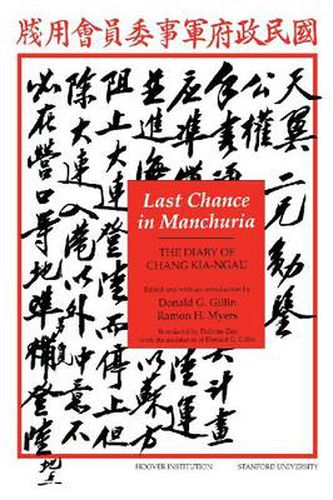Readings Newsletter
Become a Readings Member to make your shopping experience even easier.
Sign in or sign up for free!
You’re not far away from qualifying for FREE standard shipping within Australia
You’ve qualified for FREE standard shipping within Australia
The cart is loading…






This diary offers an important new perspective on the critical events leading to the end of the Chinese civil war. From September 1945 to April 1946, Chang Kia-ngau kept a daily log in the negotiations between Nationalist China and Soviet Union to recover Manchuria from Soviet military occupation. The diary reveals that the Russians actively sought Nationalist China’s cooperation in rehabilitating and operating the huge industrial complex that the Japanese had built in Manchuria during the 1930s and 1940s. The Russians were willing to let Chiang Kai-shek’s government take control over Manchuria if the Nationalists would pledge that only Russia would be able to exert foreign influence in Manchuria. Chang Kia-ngau’s diary is an eyewitness account of how Manchuria, one of the world’s greatest industrial sites, fell to the control of the Chinese Red Army and thus led to the communist victory over Chiang Kai-shek. This book will interest students of cold war rivalry, U.S. foreign policy, Soviet diplomacy, and Chinese history alike.
$9.00 standard shipping within Australia
FREE standard shipping within Australia for orders over $100.00
Express & International shipping calculated at checkout
This diary offers an important new perspective on the critical events leading to the end of the Chinese civil war. From September 1945 to April 1946, Chang Kia-ngau kept a daily log in the negotiations between Nationalist China and Soviet Union to recover Manchuria from Soviet military occupation. The diary reveals that the Russians actively sought Nationalist China’s cooperation in rehabilitating and operating the huge industrial complex that the Japanese had built in Manchuria during the 1930s and 1940s. The Russians were willing to let Chiang Kai-shek’s government take control over Manchuria if the Nationalists would pledge that only Russia would be able to exert foreign influence in Manchuria. Chang Kia-ngau’s diary is an eyewitness account of how Manchuria, one of the world’s greatest industrial sites, fell to the control of the Chinese Red Army and thus led to the communist victory over Chiang Kai-shek. This book will interest students of cold war rivalry, U.S. foreign policy, Soviet diplomacy, and Chinese history alike.